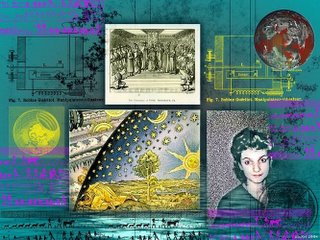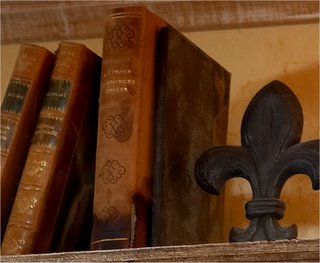I wrote about a
rite of passage recently. Within comparative religions the subject is one of my pet areas in addition to a concept of sacred or holy, contextualizing and signifying time, use of music in religions, et cetera (when it comes to the concept
holy, I urge you to read Ensio Kataja’s
new blog).
The house of consciousness with all of its floors constitutes the vertical dimension of existence. Roughly speaking, it is pretty much about
being (and it includes your body, persona, and
psyche). The house stands in the flow of time, which begins at natural birth and ends at natural death. This river constitutes the horizontal dimension of existence. This is roughly speaking pretty much about
change or
becoming (Finns with a copy of my first book might want think about
Pirun Nyrkki here, p. 83).
The house of consciousness is a hydroelectric plant of a magical sort. If you don’t work with the flow of the river (which is called
Lethe, by the way), your level of energy keeps low, the plant gets rusty and outdated, and in general you can’t really achieve too much with your life. In a certain profound sense, you are asleep even when you are awake. Things happen to you, you can’t make things happen. You have forgot yourself. If you on the other hand work with the flow, do conscious efforts to use it to get some energy to produce something precious that you
need and desire, if you remember yourself between natural birth and death, you might start to make things happen. You might start to remember yourself. You might start to unconceal mysteries and truth about the hidden dimension of existence where being and becoming are one. This is
aletheia, and its experience is sacred.
This flow of time effects our being, our multidimensional identity in many ways. A good number of those ways are very personal, but there are also experiences that in their basics are quite universal. One of these rather universal experiences is that of moving away from an old home to a new one. Typically, this experience carries with it a notable change in one’s life. Moving often marks new important phase in life, and as such it is also linked to a change in one’s experience of self, one’s status.
Moving is a perfect example of a rite of passage that we all know and can think about based on our personal experiences. I am sure we all can also find phases of separation, liminality, and incorporation from these experiences. If you are interested to learn more about them, study
Arnold van Gennep’s The Rites of Passage.
I have lived in nine homes thus far. Interestingly enough, they form a kind of
valknut with three clear groups: 3 homes I have had in
Naantali, 3 homes I have had in
Turku, and lastly, 3 homes I have had elsewhere (in
Raisio,
Esslingen, and
San Francisco). It is interesting to think about what kind of patterns these places have had in relation to each other and what kind of phases I have had in them in my life.
How many homes you have had thus far? What kind of phases of your life does those homes represent? Do you think you will move again at some point, and why and when and where? How has these domestic rites of passage influenced your path, your experience of yourself, your status? If it is
as above, so below, then what does your home tell about yourself?
 Art by Roland Winkhart
Art by Roland Winkhart  Art by Roland Winkhart
Art by Roland Winkhart If I smoke, I smoke pipe. It's healthier, more stylish and meditative, plus in numerous variations better smelling and tasting than any cigarette you can find. I never found smoking interesting for any reason – until my good friend from Stuttgart introduced me to pipes.
If I smoke, I smoke pipe. It's healthier, more stylish and meditative, plus in numerous variations better smelling and tasting than any cigarette you can find. I never found smoking interesting for any reason – until my good friend from Stuttgart introduced me to pipes. I have loved books all my life. I still remember how that passionate and enduring love affair begun. I was around five years old as I got an obsession to go to Lietsalan sivukirjasto, a little local library to explore it. My mother kindly went with me few times a week there. I always carried tons of new books home with me. During the next few years, those books of sci-fi, mystery, fantasy, religion, occultism, philosophy, science, etc., opened a whole new magical world for me. I can’t overestimate how much those books contributed to the development of my thinking and worldview... And I have been on that magical mystery tour ever since. The magic of Óðinn, that of galdr, verbal magic, is truly powerful.
I have loved books all my life. I still remember how that passionate and enduring love affair begun. I was around five years old as I got an obsession to go to Lietsalan sivukirjasto, a little local library to explore it. My mother kindly went with me few times a week there. I always carried tons of new books home with me. During the next few years, those books of sci-fi, mystery, fantasy, religion, occultism, philosophy, science, etc., opened a whole new magical world for me. I can’t overestimate how much those books contributed to the development of my thinking and worldview... And I have been on that magical mystery tour ever since. The magic of Óðinn, that of galdr, verbal magic, is truly powerful. I went to see Ovro, Beyond Sensory Experience, and des Esseintes at TVO, Turku, on Saturday night. There were people packed in a modern cave. Individuals making soundscapes and offering visuals, creating separation from everyday reality.
I went to see Ovro, Beyond Sensory Experience, and des Esseintes at TVO, Turku, on Saturday night. There were people packed in a modern cave. Individuals making soundscapes and offering visuals, creating separation from everyday reality.